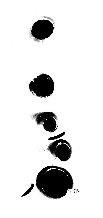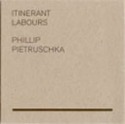
cajid 006cd
ITINERANT LABOURS
phillip pietruschka
A shambolic collection of traveller’s cheques, post-
LISTEN
Valeria (excerpt)
mp3 1:04 min 756k
Evidence of Love
mp3 3:51 min 9034k
ARTIST STATEMENT
The works presently on Itinerant Labours constitute my practical research into the tape based composition techniques of Pierre Henry and Luigi Nono, amongst others. Within each composition there is a complex tapestry of concrete, instrumental, and electronic sounds.
Specifically, each piece is a study or commentary on a particular film or films and the accompanying soundtrack. The films were chosen as provide a significant point of intersection between the cloistered world of avant garde and experimental music and the populist world of cinema. Acting as an introduction of such music for many people -
Valeria has been previously presented at the Sydney Opera House Gallery as part of the D'Art 04 festival.
I Love Coeds was used as the soundtrack to the video Vengence is Mine, directed by Cassandra Tytler. This video was first presented at Gerturde St Contemporary Art Spaces as part of the Cult Classics show during the 2004 Next Wave Festival.
Hidden Lattitudes of Truth and Non-
The Evidence of Love was composed for a installation by Cassandra Tytler. The installation was first presented in 2004 at Westspace Art Gallery. The soundtrack has also appeared on the Decomposition CD published by Sound Punch, and a Retrospective CD published by Liquid Architecture to accompany an issue of The Wire magazine.
REVIEWS
Touching Extremes
Massimo Ricci -
Despite his surname, Pietruschka hails from Melbourne, Australia where he's active both as a composer and improviser. His studio work is reportedly influenced by the likes of Pierre Henry, Luigi Nono and Ennio Morricone, yet there are moments in "Valeria" -
Paris Transatlantic
Lawrence English May 2007
Phillip Pietruschka has been long overdue for a widely distributed release and this issue from Cajid is a welcome addition to their roster. Based in Melbourne, Pietruschka has existed somewhat off the wider radar, concerning himself with a series of projects and works that have kept his attentions close to home. Here he steps out and in doing so offers up a vivid, if scattered impression of his sonic psyche. Scattered though the sounds might be, they carry with them a sense of direction and drive which lends this record a particular potency. Pietruschka's meticulous compositional choices give the music a sense of controlled audio clutter in which various elements jostle for position (instrumental source sounds come courtesy of Andrew Barrie, Nat Bates, David Brown, Anthea Caddy, Tim Catlin, James Cecil, Gus Franklin, Will Guthrie, Arwen Johnson, Sianna Lee, Antonia Sellbach and Adam Yee); when one rises above the rest it provides a sense of resolution to the blurry focus. Dramatic shifts are thin on the ground until a third of the way through "Lucuna", where his procedures undergo a sharp redefinition as he abruptly introduces a whopping wall of distorted noise. It's the kind of radical shift that might occur in a horror film, moments of everyday life suddenly shattered as some vicious instrument of death pierces through a living body. These unexpected interruptions continue through the piece with varying success. But they pale in comparison with the pop section of "The Evidence Of Love", which sounds like a facsimile of Stereolab oddly out of place in the more refined avant company of the other pieces. Perhaps that's the point. At just under 30 minutes, Itinerant Labours raises more questions about Pietruschka than it provides answers to. We await the next dispatch with interest.
Vital Weekly
Frans De Waard
This is certainly one of the stranger CDs I heard lately. Pietruschka studied electro-


